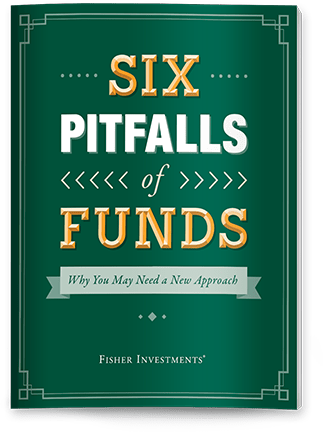Mutual Funds for Retirement
However, these types of collective investment vehicles may not be the best asset type for everyone. Fisher Investments believes high net worth investors should consider a few key factors before investing in mutual funds—including fees, taxes and potential diversification risks.
Do the Fund’s Objectives Match Your Goals?
Mutual funds invest in securities like stocks, bonds, cash equivalents and other assets. The fund’s managers often target a specific investment goal or objective (i.e., income or capital appreciation). These investment objectives are stated in the mutual fund’s prospectus or statement of information (SAI), which contains detailed information about the fund.
When you have mutual funds in your retirement account, you usually have little control over the investments within the funds or the funds' asset allocation. Your assets are mixed with those of other investors, and you share in the gains and losses proportional to your contributions.
Types of Mutual Funds
Many different types of mutual funds exist, each with their own investment objectives and of costs, which can make it challenging to select one appropriate for your retirement. Here are some common types of mutual funds:
- Specific asset-oriented funds: These can include stock and bond funds, or funds more specific to a particular investment category like company size or investment style.
- Index funds: These funds are designed to mimic the performance of a market index like the S&P 500, NASDAQ, FTSE or other indexes.
- Balanced funds: These often feature an asset allocation comprised of a mix of different types of securities.
- Income funds: This type of fund focuses on income-generating investments such as dividend-yielding stocks, bonds or other fixed income instruments.
- Specialty funds: These might focus on specific sectors, regions, or socially responsible investment strategies.
Open-Ended Funds and Closed-End Funds
There are two broad categories of mutual funds: open-ended and closed-ended. Open-ended mutual funds have no restrictions on the number of shares they can issue to investors. If demand for the fund increases, the fund will buy more of the underlying investments. The value of each share is based on the market value of the underlying assets, or net asset value (NAV).
A closed-end fund, on the other hand, has a fixed number of shares available for purchase. The NAV of closed-end funds is calculated regularly, based on the value of assets in the fund. The price it trades for on the exchange, however, is market-driven. As such, a closed-end fund can trade at a discount or a premium compared to its NAV.
However, the “easily diversification” mutual funds can provide may have a downside. If you own multiple mutual funds, you could have overlap in exposure or duplication of assets. This could lead to unintentional overconcentration in certain sectors, styles or specific stocks—potentially defeating the purpose of diversification.
To prevent possible overconcentration, know what your mutual funds hold. More broadly, it is important to determine your exposure across your broader portfolio and not just within each specific fund.
Don’t Overlook Mutual Fund Fees
Different mutual funds have different costs and fees, most of which you can find in the fund’s prospectus, SAI or annual reports. Some of these fees may be paid out of the fund’s assets, which can make these fees easier to overlook.
Keep in mind fees are usually charged as a portion of the fund’s assets, which means the dollar amount of your fees can rise and fall with the market.
Here are some of the fees you should be aware of:
- Sales commissions/loads. Loads, also known as sales charges or sales commissions, are fees you pay to your financial representative—not the mutual fund issuer—when you buy or sell fund shares. These fees are paid when you purchase or redeem fund shares. There are two main types of loads:
- Front-end loads: You pay front-end loads when you purchase shares of a fund. Oftentimes, front-end loads decrease as you invest more in the fund and may eventually go down to zero if you invest enough.
- Back-end loads: Back-end loads are paid when you sell or redeem shares of a fund. Depending on the fund, back-end loads may diminish overtime the longer you stay invested.
When you select mutual funds, you may notice funds with the same name but with different classes of shares and different prices. When and how these fees are charged depends on the share classes. A-shares typically come with front-end loads, while B-shares charge back-end loads. C-shares sales fees can vary sometimes charging small exit sales fees, which are typically waived after one year.
- Trading costs. Similar to individual investors paying commissions when buying and selling shares, mutual funds have to pay fees to brokers when they rebalance their portfolio or liquidate assets to pay out redemptions. As a shareholder, you will have to pay your share of those fees, as well as taxes on any realized capital gains (in proportion to your holdings).
- Expense ratios/total annual fund operating expenses. These combine all of the fund’s associated fees as a percentage of your investment —including administration fees, management fees and other recurring annual fees. A few of the more common expense ratio fees include
- Management fees. As a shareholder, you will have to pay a percentage of your total assets toward management fees. These fees pay for the management of the fund and its investments.
- 12b-1 fees. These cover distribution costs, marketing costs and sometimes shareholder services. You are charged these fees for as long as you hold the shares.
Assets are often sold to cover investor redemptions or to rebalance the fund. This can result in commissions. You’ll have to pay a portion of these commissions, which could affect your realized short- and long-term returns. Because capital gains are distributed across all of the mutual fund’s individual shareholders, you could end up paying taxes on these gains even if you don’t personally redeem any shares yourself, or even when the overall fund incurs a loss.
That means you can lose money and still have to pay taxes!
You can also be responsible for paying capital gains on investments that were bought before you even purchased a share of the mutual fund—even if they incurred a loss while you held them.
You could avoid some of these tax pitfalls by purchasing mutual funds through a tax-advantaged account such as a 401(k) or individual retirement account (IRA).* But, at some point, you may wish to roll over mutual funds into a taxable account, which could expose you to more taxes.
Find a Better Solution
If you are a high net worth investor, a personalized, separately managed portfolio might better meet your investment objectives. By purchasing securities directly, you have more flexibility to tailor your portfolio to your specific needs while still achieving the diversification mutual funds often provide.
With this option, you can buy and sell securities according to your tax preferences. That’s helpful because as your assets grow over the years leading up to retirement, your tax situation will likely become more complex. *It is a good idea to consult a tax professional to better understand the specifics of your situation.
What to do Next
The layered fees, diversification risks, lack of flexibility and tax implications of mutual funds in a retirement account could be eating into your future retirement income. To learn more, with one of our professionals.
*The contents of this article should not be construed as tax advice. Please contact your tax professional.









